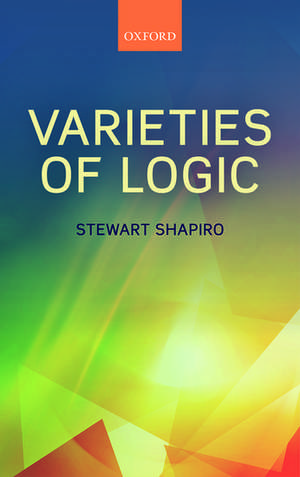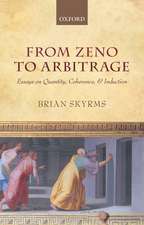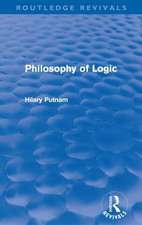Varieties of Logic
Autor Stewart Shapiroen Limba Engleză Hardback – 4 sep 2014
| Toate formatele și edițiile | Preț | Express |
|---|---|---|
| Paperback (1) | 187.85 lei 10-17 zile | |
| OUP OXFORD – 16 iun 2020 | 187.85 lei 10-17 zile | |
| Hardback (1) | 478.14 lei 31-38 zile | |
| OUP OXFORD – 4 sep 2014 | 478.14 lei 31-38 zile |
Preț: 478.14 lei
Preț vechi: 577.63 lei
-17% Nou
Puncte Express: 717
Preț estimativ în valută:
91.49€ • 95.52$ • 75.72£
91.49€ • 95.52$ • 75.72£
Carte tipărită la comandă
Livrare economică 24-31 martie
Preluare comenzi: 021 569.72.76
Specificații
ISBN-13: 9780199696529
ISBN-10: 0199696527
Pagini: 236
Dimensiuni: 148 x 222 x 19 mm
Greutate: 0.41 kg
Editura: OUP OXFORD
Colecția OUP Oxford
Locul publicării:Oxford, United Kingdom
ISBN-10: 0199696527
Pagini: 236
Dimensiuni: 148 x 222 x 19 mm
Greutate: 0.41 kg
Editura: OUP OXFORD
Colecția OUP Oxford
Locul publicării:Oxford, United Kingdom
Recenzii
Shapiro's wide-ranging and thought-provoking book marks a major milestone in the recent debate initiated by JC Beall and Greg Restall's influentialLogical Pluralism (Beall and Restall 2006)
Stewart Shapiro's book is convincing ... The case for logical pluralism has been made before, but with Shapiroâs book we get an argument for pluralism that promises to resonate not only with logicians but with classical mathematicians.
It is a rich book, which, apart from contributions to logical pluralism, makes connections between the philosophy of logic, philosophy of language, philosophy of math, and epistemology There is much to like in Shapiro's Varieties of Logic. It is an engaging contribution to the debates over logical pluralism that articulates an appealing pluralist position, and it highlights many fruitful connections between the philosophy of logic and other areas of philosophy. It will be required reading for anyone interested in logical pluralism or the philosophy of logic
Varieties of Logic will become the standard text on logical pluralism, and will likely set the agenda for debates on the topic for years to come.
Stewart Shapiro's book is convincing ... The case for logical pluralism has been made before, but with Shapiroâs book we get an argument for pluralism that promises to resonate not only with logicians but with classical mathematicians.
It is a rich book, which, apart from contributions to logical pluralism, makes connections between the philosophy of logic, philosophy of language, philosophy of math, and epistemology There is much to like in Shapiro's Varieties of Logic. It is an engaging contribution to the debates over logical pluralism that articulates an appealing pluralist position, and it highlights many fruitful connections between the philosophy of logic and other areas of philosophy. It will be required reading for anyone interested in logical pluralism or the philosophy of logic
Varieties of Logic will become the standard text on logical pluralism, and will likely set the agenda for debates on the topic for years to come.
Notă biografică
Stewart Shapiro received an MA in mathematics in 1975, and a PhD in philosophy in 1978, both from the State University of New York at Buffalo. He is currently the O'Donnell Professor of Philosophy at the Ohio State University. He specializes in philosophy of mathematics, logic, philosophy of logic, and philosophy of language, with a recent interest in semantics, and is the author of Foundations without foundationalism: a case for second-order logic (OUP, 1991), Philosophy of mathematics: structure and ontology (OUP, 1997), Vagueness in context (OUP, 2006), and a textbook in the philosophy of mathematics, Thinking about mathematics: the philosophy of mathematics (OUP, 2000).










